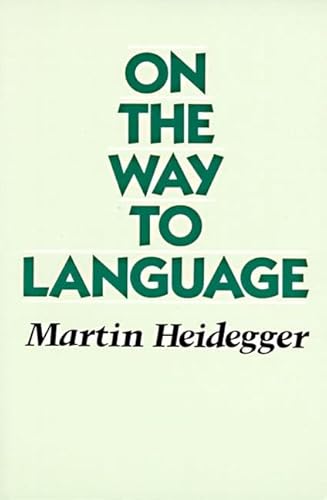On the Way to Language
Martin Heidegger
BOOK REVIEW

In a world where communication shapes our very existence, On the Way to Language by Martin Heidegger emerges as a profound exploration of the intricacies of linguistic expression. As the shadows of the 20th century loom over this work, published in 1982, it stands not merely as an academic discussion but as a striking commentary on the essence of human experience and understanding. It invites us, yes, beckons us to confront the very foundations of our thought and discourse.
Heidegger, a titan in the realm of philosophy, challenges the complacency of our everyday language. He compels you to reflect on the roots of linguistic existence, reminding us that words are more than mere tools for communication; they are the fabric of human connection, the bridge that spans the chasm between isolation and community. As you delve into this text, you'll find it impossible to remain untouched by its meditative quality. It reverberates through your thoughts and emotions, much like the echoes of a deep conversation that linger long after the words fade away.
Throughout its pages, Heidegger invites us into a labyrinth of contemplation. He navigates through the dense thicket of how language shapes our perception of reality. Words, he asserts, are not static; they are alive and constantly evolving, nurturing our thoughts while simultaneously constraining them. This duality-that language liberates us while simultaneously imprisoning us-casts a shadow throughout the work, provoking deeper introspection. It's a message that resonates today, when the very nature of communication is ever-evolving through the very technology meant to connect us.
Critics, however, have not held back in their appraisal of On the Way to Language. Some readers find Heidegger's style dense and esoteric, arguing that the philosophical jargon can alienate rather than enlighten. Yet, isn't that a reflection of the very challenge he proposes? The struggle to engage with his ideas mirrors our struggle to authentically engage with one another in an age of superficial connections. For those willing to navigate these intellectual waters, the rewards are profound, illuminating layers of meaning that reside deep within our everyday interactions.
As the examination of Heidegger's theory unfolds, you might feel a storm of emotions: frustration at the complex sentences, awe at the insights being unearthed, and perhaps a melancholy realization of how often we misuse language in our daily lives. The reader's journey through this philosophical landscape is not meant to be comfortable. Instead, it serves as a powerful reminder of the stakes involved in our engagement with language. Each thought, each word exchanged builds the essence of our communal existence.
Heidegger's influence stretches far beyond the realm of philosophy; it extends into literature, psychology, and even the digital humanities, echoing through the works of thinkers like Jacques Derrida, who further interrogate the implications of language and meaning. As you leaf through the pages of this remarkable text, you might find yourself reflecting on the giants upon whose shoulders Heidegger stands. The question lingers: how might your own relationship with language evolve as a result of these insights?
In the end, On the Way to Language is not just a book; it's an invitation-an invitation to reconsider how you communicate, think, and even connect with the world around you. Lean in closer to the text, savor its rich offerings, and perhaps allow it to ignite a new passion for the transformative power of language. As you grapple with Heidegger's ideas, you may find that the path to understanding is as vital as the destination itself. 🌊 Dive into this philosophical deep end, and perhaps, just perhaps, you'll emerge forever changed.
📖 On the Way to Language
✍ by Martin Heidegger
🧾 200 pages
1982
#language #martin #heidegger #MartinHeidegger